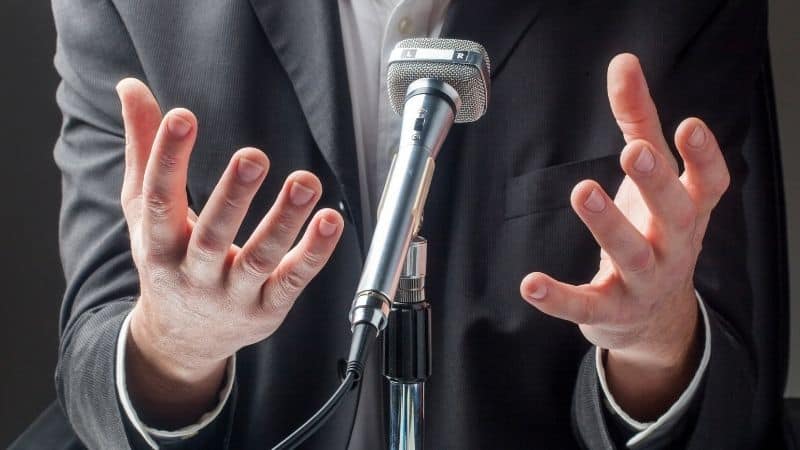Some speakers try jokes that don’t fit the room, then decide humor is “not for them.” In this article, Jef Menguin teaches a safer way to use humor with purpose—so it supports your idea instead of stealing the show. If you want to learn how to keep people engaged and create your stage with confidence, this will help.
You are standing in front of an audience, and they’re hanging on to your every word, not just because you’re speaking, but because you’re making them laugh. That’s the magic of humor in speeches.
Humor makes people more engaged. It entertains and educates them at the same time. When told in stories, humor resonates because the audience sees themselves in those tales.
As professional speakers like Ken Robinson and Brené Brown have shown us in their TED Talks, humor isn’t just for decoration; it serves a purpose. It engages the audience and teaches them without them even realizing it.
The Power of Humor
Humor breaks down barriers. It makes you relatable and likable, which is crucial for connecting with your audience. When people laugh, they relax and become more receptive to your message.
Humor also helps to highlight key points, making them more memorable. It’s no wonder that some of the most popular TED Talks use humor effectively.
Self-Deprecating Humor
One of the easiest ways to connect with your audience is through self-deprecating humor.
By making fun of yourself, you show humility and make the audience feel comfortable. It’s a great way to break the ice and set a friendly tone.
Example: In one of my speeches, I started by saying, “Some people think I look like Marvin Agustin, but most see Manny Pacquiao. I like to say it’s a great way to test their eyesight!” The audience laughed, and it instantly made me more relatable.
This simple joke broke the ice and set a light-hearted tone for the rest of the speech.
Ken Robinson, in his famous TED Talk about how schools kill creativity, uses self-deprecating humor to great effect. He jokes about his own education and experiences, which makes the audience relate to him and his message more deeply.
Funny Anecdotes
Stories are powerful, and funny stories are even more so. When you tell a funny anecdote, you engage the audience’s emotions and imagination. They see themselves in your stories, and this connection keeps them engaged.
Example: During a leadership workshop, I shared an experience from my early days as a manager. “I once tried to motivate my team with an inspirational quote. I said, ‘Remember, there’s no I in team!’ One of my team members replied, ‘But there’s a U in suck.’
We all burst out laughing, and it was a great lesson in knowing your audience and finding the right words.”
Brené Brown uses humorous anecdotes in her TED Talks to great effect. She tells stories about her own vulnerabilities and mishaps, making her message about courage and connection even more impactful.
Playful Interactions
Engaging your audience through playful interactions can make your speech more dynamic and memorable. Involve your audience with humorous questions or activities.
This not only keeps them engaged but also reinforces your message.
Example: In a workshop on public speaking, I once asked the audience, “Who here hates speaking in front of people?” Almost everyone raised their hands. I then said, “Me too! That’s why I became a public speaker – to confront my fears in the most ridiculous way possible!” This playful interaction got everyone laughing and participating, making the workshop more enjoyable and effective.
One of the most popular TED speakers, Amy Cuddy, uses playful interactions in her talks. She asks the audience to perform power poses, making her sessions interactive and memorable while driving home her points about body language and confidence.
Using Humor with Purpose
Humor isn’t just for making people laugh; it’s a tool to engage and educate. Here’s how to use humor effectively in your speeches:
- Relate to Your Audience: Use humor that your audience can relate to. This makes you more relatable and helps to build a connection.
- Use Humor to Highlight Key Points: Use funny stories or jokes to emphasize important points. This makes your message more memorable.
- Keep It Natural: Don’t force humor. Let it flow naturally from your stories and experiences. Forced humor can feel awkward and disengage your audience.
Final Thoughts
Incorporating humor into your speeches can transform them from good to great. It breaks down barriers, makes you more relatable, and keeps your audience engaged.
Remember, humor should serve a purpose. It should be used to engage your audience and help memorably convey your message.
In my two decades of speaking, I’ve found that humor, when used effectively, has never failed to captivate my audience. It turns skeptical listeners into raving fans and transforms mundane talks into unforgettable experiences.
So, the next time you step up to speak, remember to laugh and learn. Your audience will thank you for it.
Using humor is not about becoming a comedian. It’s about finding those moments of levity in your own stories and experiences that resonate with your audience.
Make your speeches more engaging and your message more impactful. So go ahead, inject a little humor into your next speech. You might just find that it makes all the difference.
If your team is stuck in meetings, misalignment, or slow decisions…
Let’s design one shift they can use immediately.
→ Shift Experiences






